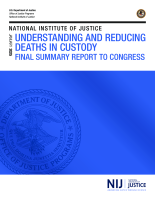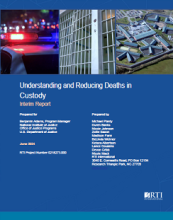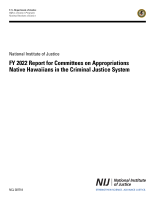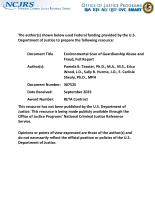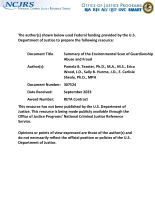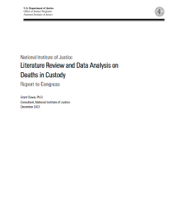Attorney General
Understanding and Reducing Deaths in Custody: Final Research Report
Understanding and Reducing Deaths in Custody, Interim Summary Report
Understanding and Reducing Deaths in Custody, Interim Report
Expert Testimony: Presenting Forensic Evidence in the Courtroom
George Mason University and the National Association of Attorneys General presents the National Center on Forensics Continued Training Plan to provide additional training sessions for more advanced information on the topics covered in the conference.
See the YouTube Terms of Service and Google Privacy Policy
DNA Mixtures
George Mason University and the National Association of Attorneys General presents the National Center on Forensics Continued Training Plan
See the YouTube Terms of Service and Google Privacy Policy
Advancing Justice for the Missing and Unidentified Through Research - 2024 NIJ Research Conference
Forensic science research is developing essential knowledge to fill in the holes in death investigations, creating new ways to identify challenging skeletal remains. These methods inform cause of death, time of death, and familial relationships to guide investigations, identify suspects, support prosecutions, and bring justice to families.
See the YouTube Terms of Service and Google Privacy Policy
Celebrating 10 Years of NIJ’s Law Enforcement Advancing Data and Science (LEADS) Scholars Program - 2024 NIJ Research Conference
In 2014, NIJ established the Law Enforcement Advancing Data and Science (LEADS) Scholars Program to support research-minded, mid-career sworn law enforcement officers working to integrate research into agency policy and practice. The LEADS Scholars Program helps participants develop independent research and provides support to identify current evidence on priority issues.
See the YouTube Terms of Service and Google Privacy Policy
Expert Testimony: Presenting Forensic Evidence in the Courtroom
Just Science Podcast: Just Sexual Assault Response For Cases Without DNA Evidence
Working Together on a Criminal Case: Agency Communications
Discovery, Disclosure and Ethical Considerations
Frye, Daubert, and PCAST: Countering Admissibility Challenges
Qualifications of an Expert Witness for Legal Professionals—The Daubert and Frye Standards
A Data-Informed Response to Emerging Drugs
The emerging drug crisis in the U.S. touches both criminal justice and public health, and experts from both fields came together at NIJ’s 2023 National Research Conference to discuss strategies and tools to fight this problem. Dr. Frances Scott, NIJ scientist and program manager, continues the conference discussion with two fellow panelists: Ciena Bayard, the Method Development and Validation Program Manager for D.C. Office of the Chief Medical Examiner, and Haley Greene, the Deputy Epidemiologist for the Central Region for the Virginia Department of Health. Read the transcript.
FY 2022 Report for Committees on Appropriations Native Hawaiians in the Criminal Justice System
Support Activities under Section 13(d) of Executive Order 14074: Workshops on Law Enforcement Use of Probabilistic DNA Technologies and Person-based Predictive Policing
Environmental Scan of Guardianship Abuse and Fraud, Full Report
Summary of the Environmental Scan of Guardianship Abuse and Fraud
Embodying Evidence to Action: Tracking the Impact of Three Key NIJ Research Investments
2023 NIJ Research Conference Opening Ceremony
The theme of NIJ’s 2023 Research Conference was “evidence to action,” and our goal was to bring researchers and practitioners together to learn about the latest research evidence and how it can be implemented to promote safety, equity, and justice.
The opening ceremony included remarks from U.S. Attorney General Merrick B. Garland, Assistant Attorney General for the Office of Justice Programs Amy Solomon, and NIJ Director Nancy La Vigne.
See the YouTube Terms of Service and Google Privacy Policy


